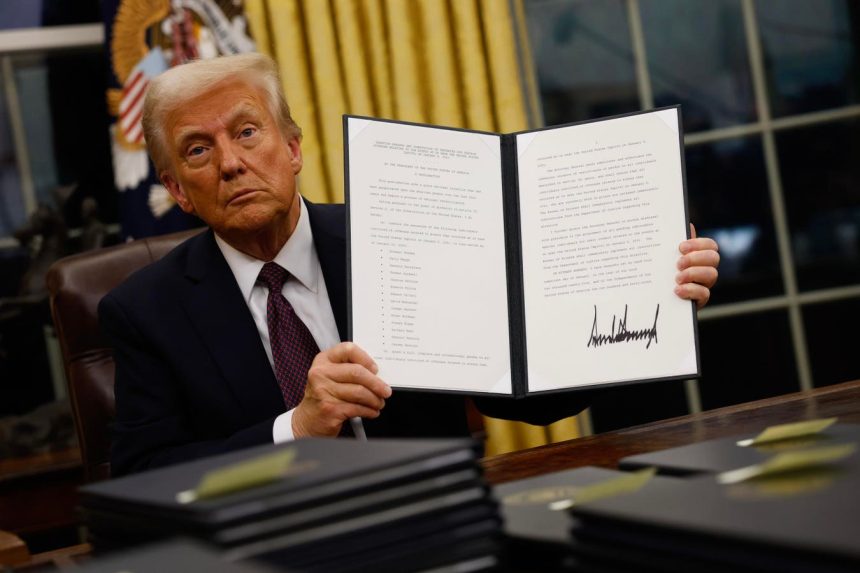President Donald Trump’s recent executive actions mark a significant shift in military policy, focusing on reversing diversity, equity, and inclusion (DEI) initiatives and impacting transgender service members and those previously discharged for refusing the Covid-19 vaccine. These orders, expected to be signed shortly, represent an expansion of Trump’s broader efforts to dismantle DEI programs across the federal government, an initiative he launched on his first day back in office. The anticipated directives aim to rescind existing military DEI practices, reinstate service members dismissed for vaccine refusal with back pay, and establish new guidelines concerning transgender individuals in the military, including provisions related to gender pronouns and physical and mental readiness standards.
The potential ban on transgender individuals serving in the military represents a return to a policy Trump enacted in 2019, later reversed by the Biden administration. This ban, if implemented, would affect a significant number of service members, with estimates suggesting around 14,000 transgender individuals were serving as of 2018. The proposed guidelines regarding gender pronouns and readiness standards could particularly impact those undergoing gender transition. The reinstatement of service members discharged for refusing the Covid-19 vaccine, numbering approximately 8,000, fulfills a campaign promise by Trump and aligns with his broader skepticism of vaccine mandates.
Trump’s actions against DEI initiatives extend beyond the military, encompassing all federal agencies. He has characterized these programs as “forced illegal and immoral discrimination programs” and has taken swift action to eliminate them, placing DEI staff on paid leave. An additional executive order limits gender recognition to male and female, overturning a Biden-era policy that allowed for a non-binary “X” gender marker on passports. These measures reflect a broader conservative pushback against DEI programs, arguing they promote reverse discrimination and prioritize identity politics over merit.
Newly appointed Defense Secretary Pete Hegseth has signaled his strong support for Trump’s directives, emphasizing the immediate compliance expected from the Pentagon. Hegseth, a known critic of DEI initiatives, has publicly affirmed that the Department of Defense will adhere to the President’s orders without exception. His appointment further solidifies the administration’s commitment to these policy changes. This swift and decisive action underscores the administration’s prioritization of these issues and its intention to implement them swiftly.
The implications of these executive orders are far-reaching and potentially contentious. They raise legal questions regarding discrimination and the rights of transgender individuals and those who exercised their right to refuse vaccination. The impact on military morale and readiness is also a concern, as these policies could alienate some service members and potentially lead to a loss of experienced personnel. Moreover, these actions will likely face legal challenges and further fuel the ongoing national debate surrounding diversity, inclusion, and individual liberties.
The reversal of DEI programs raises questions about the future of diversity and inclusion efforts within the federal government and the military. Critics argue that these programs are essential for fostering a more inclusive and equitable workplace, while supporters of the ban believe they promote division and reverse discrimination. The reinstatement of discharged service members could create logistical and financial challenges for the military, as well as raise concerns about the precedent it sets for future vaccine mandates. The ban on transgender service members is likely to be particularly controversial, with opponents arguing it is discriminatory and harmful to transgender individuals who wish to serve their country. The legal and social ramifications of these executive orders will continue to unfold in the coming months and years.



